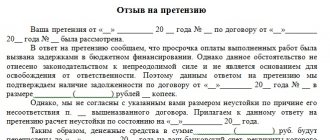What is a contract?
Contracts are used to regulate relationships in a wide variety of areas of life. Filming a movie, building a house or garage, restoring a building, preparing technical documentation - all these events can be reasons to sign a contract for contract work.
- By its legal nature, a work contract is similar to other types of transactions mentioned in the Civil Code of the Russian Federation (Civil Code of the Russian Federation). Similarities can be seen with an agreement for the provision of paid services, purchase and sale, delivery, even with an employment contract. However, the contract has its own characteristic features that distinguish it from other types of transactions. These features include: the contract regulates the process of performing the work itself, and not just the final result;
- the result of fulfilling the terms of the agreement is the receipt of a certain result, separable from the process of providing the service, in contrast to the contract for the provision of services;
- the contractor is obliged to establish a warranty period for the result of the work;
- ownership passes to the customer along with the actual transfer of the result of labor activity.
In addition, the contract must include a deadline for the completion of work, the start of work, and interim deadlines. If there is no specific time frame in the body of the contract, it may be considered not concluded.
The legislator distinguishes the following types of contracts aimed at:
- To perform work designed to satisfy the household or other personal needs of the customer. For example, a contract for the manufacture of furniture.
- For construction and repair work.
- For the development of technical documentation and carrying out survey work.
- For construction and related work on the instructions of a state or municipal customer.
Basic information
Nowadays, concluding contracts is an integral part of every person’s life. These could be ordinary citizens, entrepreneurs with businesses or entire plants and factories.
If it is necessary to hire a contractor to perform any work, every citizen wants to have guarantees of a successful result, compliance with quality, and to know that his money was not wasted.
This is precisely why there are different types of contracts, with the help of which you can take into account all kinds of desires, specify the nuances, and get the desired result exactly on time.
Even taking into account the formalities and conclusion of contracts, sometimes troubles occur. For example, the contractor did not show up for work or did a poor job.
And customers do not always behave decently when it comes time to pay for work performed. Therefore, to resolve such problematic situations, there is a way to resolve them.
This is a claim. It allows you to try to resolve a controversial situation at its earliest stages, without involving a lawsuit.
And sometimes, a claim is one of the necessary actions specified in the contract, which the dissatisfied party must send, thus informing the other about the problem that has arisen in the transaction.
For example, when the contractor has already completed the work, but the customer, during inspection, discovered a discrepancy in the work.
When the conflict escalates and the parties ignore each other's wishes, a grievance will begin the process of resolving such problems.
What it is
In order to understand the topic of the article, I suggest you familiarize yourself with the basic concepts.
Regardless of the type of contract, the transaction can be made between any person wishing to hire a contractor to perform work, and the contractor must be an exclusively business person and specialize in performing the required task.
Also, there are sometimes agreements that have a tripartite structure. If we talk about the types of contracts, the legislator identifies 4 main ones:
| Household contracting | Work related to the customer’s household or personal goals |
| Construction contract | For construction work |
| By government order | Execution of orders required by state authorities and municipalities |
| To carry out survey and design work | Carrying out the necessary work, and if errors are found, eliminating them |
Now let's talk about the claim. This is a letter that has a claim nature regarding the terms of the transaction.
It can be used by both the contractor and the customer in case of disputes or other dissatisfaction with the transaction.
The main reasons that force us to file a claim are:
| Poor quality work | Detection of defects, non-compliance with quality |
| Late execution | Violation of deadlines by one of the parties in accordance with its obligations specified in the contract |
| Imposition of other types of work by the contractor | And deviation from the customer’s original plans when concluding a deal |
| The work was partially completed | Leaving incompleteness or deficiency |
| Hidden defects were identified | — |
These are only the most common cases, however, each counterparty may have its own grounds for making a claim.
Necessary grounds
After concluding a transaction, it often happens that the desired outcome is not what we expect, so we will consider the grounds on which each of the parties to the contract has the right to make a claim:
| Base | Characteristic |
| In case of non-payment | When the work is completed, but the customer does not want to transfer funds |
| Overdue | It can manifest itself in the delivery of goods by the customer, completion of work within the specified time frame by the contractor, etc. |
| Failure to fulfill other obligations | An unsatisfactory result of a transaction in which one of the parties suffers losses |
But there are also cases when the claim is not justified, for example, when the customer noticed a defect after the warranty had expired. All such nuances must be indicated in the contract.
The most common type of claim is for one party to indemnify the other. And this process is regulated by the civil code, Art. 15.
According to it, one of the parties has the right to compensation for losses if:
- The order was completed late.
- While performing work, the contractor caused damage to the customer's property.
- When inspecting the work, the customer demanded that some of the work be eliminated and redone, and the contractor refused to eliminate the deficiencies in the work.
- If, when performing the work, the contractor involved other persons who were not included in the contract.
- The customer does not respond to the need to replenish materials to complete the work.
- The customer violated his obligations even before the completion of the work.
- The customer did not fulfill his obligations, and therefore the contractor suffered losses.
The legislative framework
The work contract is regulated by the civil code, starting from Articles 702 - 768, which contains the rights and obligations of the parties, and the nuances of drawing up such a transaction.
If we talk about the claim, it is described by another norm, Art. 452 of the Civil Code of the Russian Federation, according to which it is described how to write a response to such a letter to the counterparty. The preparation of such a document itself is not regulated by law.
What requirements can be put forward in a claim?
The requirements that are specified in the claim directly depend on which obligations were violated.
You can obtain from the violator:
- Pay for work performed when a claim is made under a contract for payment for work performed.
- Compensate for poorly performed work.
- Terminate contractual obligations. For example, in the case of construction work involving subcontractors without the consent of the customer, a claim is filed for early termination of the agreement with the developer. The agreement will be declared invalid provided that this condition was stipulated when concluding the construction contract.
- Pay the due penalty. This requirement can be put forward even if this clause is not mentioned in the contract (if the requirements of Articles 708, 711, 718, 719, 720 of the Civil Code of the Russian Federation are violated).
- Compensate for material losses – lost profits and the amount of losses incurred.
- Pay interest for the use of someone else's money if the monetary obligation was not fulfilled within the agreed period.
- Correct deficiencies.
- Reduce the price of the work in proportion to the existing defects.
- Reimburse the costs of eliminating defects.
Before entering into an agreement, the parties must foresee in advance the procedure for resolving disputes and draw up a comprehensive list of potential risks.
Requirements for the quality of work performed may be directly provided for in the contract, including in the form of a reference to any standard, manual, application, etc. For example, the contract may indicate that, in appearance, the result of the work performed must fully comply with the sketch provided by the customer. If a defect is discovered, the customer may, at his choice (Part 1, Article 723 of the Civil Code of the Russian Federation):
- require the contractor to eliminate defects free of charge within a reasonable time;
- reduce the price set for the work proportionately;
- reimburse their costs for eliminating deficiencies, if such a right of the customer is provided for in the contract.
It happens that the requirements for the quality of work performed are not fully provided for in the contract or are completely absent.
Requirements for the quality of work may be imposed by laws or other legal acts. Moreover, for non-compliance with them, the contractor bears legal responsibility not only to his customer, but also to the state represented by its authorized bodies.
In what cases is it possible to file a claim?
Failure to fulfill the terms of the contract can manifest itself in different forms, which include the following:
- The unilateral refusal of the contractor to fulfill obligations under the contract, as a result of which the customer incurs losses. Moreover, if the contractor refuses to compensate for the damage, this is grounds for filing a claim.
- Failure to comply with the terms of the contract, or their fulfillment not within the established time frame.
- Refusal to pay a penalty or fine under the contract.
Important! Poor quality performance of services (work) under a contract is considered not as a refusal to fulfill obligations, but as improper fulfillment of obligations.
Main reasons for filing a claim
A claim is a demand to eliminate violations. The main reason for writing it is the failure of one of the parties to fulfill the terms of the contract.
In legal relations arising when concluding a work contract, the reason for filing a claim may be:
- Violation of deadlines. A claim is filed under a contract for violation of payment deadlines or deadlines for delivery of work.
- Quality that does not meet the standard requirements for this category of work or the requirements stipulated by the contract.
- Increase in the cost of work without agreement with the customer.
- Refusal to pay due financial penalties.
- Refusal to compensate for damages caused.
- Damage to the customer's property due to the fault of the contractor.
- Refusal to correct deficiencies in completed work.
These are the most common causes of complaints from the customer of the work.
The claim of performers under a contract most often concerns a violation of the clause on payment for work. In addition to non-payment of remuneration (full or partial), the reasons include:
- non-compliance with the procedure for receiving work results;
- provision of low-quality materials and tools to perform the work;
- the customer’s refusal to fulfill its obligations, which leads to losses for the contractor.
Also, the reasons for writing a claim may be other events provided for by law or the terms of the contract.
The form and content of the claim are not regulated by any legislative act.
We suggest you read: Is it possible to officially work two jobs?
However, in order for a claim to be considered an official document and be considered in court as evidence, it must include the following information:
- To whom it is sent. The claim must be addressed to the person legally responsible for the actions of the organization. If the contract is violated by a legal entity, then the claim is written to the director of the company. If the violation was committed by an individual entrepreneur, the claim is filed in his name.
- Who is making the claim? All registration details are indicated.
- The address where the enterprise (company) is registered.
- Name. The document can be called “claim”, “notification”, “demand”, “statement”, “complaint” - the main thing is that it is clear from the meaning of the document that this is a claim.
- Date of conclusion of the agreement and its number.
- The essence of the concluded agreement. The document indicates the obligations assumed by the parties.
- The essence of the complaint. The clauses of the contract that were not fulfilled are listed.
- Legislative norms proving the correctness of the position of the dissatisfied party. They use the provisions of the Civil Code of the Russian Federation, the Law on the Protection of Consumer Rights, standards and GOSTs established for construction work and other regulatory legal acts.
- Calculation of losses and total amount to be recovered.
- Listing options for resolving a controversial situation.
- Deadline for fulfilling the requirements.
- List of applications. In addition to the contract, you must attach documents confirming the position of the party that sent the claim. This could be a work schedule, estimate documentation, photos and video evidence of violations, and payment documents.
There are no uniform templates for drawing up a claim under a work contract. This is due to the variety of relations regulated by this agreement. For example, there are claims under the contract to eliminate defects in the work or to complete the work, to pay a penalty for violating the deadline for delivery of the project, and others. Each case is regulated by Chapter 37 of the Civil Code of the Russian Federation and other legislative acts, therefore, when drawing up a claim, an individual approach is required.
“Under the contract (number), the Contractor (name of organization) was required to perform (a list of works or services indicating specific clauses of the contract) and transfer the completed work to the Customer (name of organization) on time (indicate the period stipulated by the contract). The Customer had to accept the work performed by the Contractor and pay the Contractor the amount stipulated by this agreement. The Customer fulfilled its obligations to pay for the work in full.
For his part, the Contractor violated the clauses (list of violated clauses of the contract), which are determined by the contract and the norms of the current legislation (links to violated laws). In this regard, I demand (list of requirements, for example, to eliminate deficiencies). In case of failure to comply with the stated requirements before (specify a specific period), the Customer submits the statement of claim to the court.”
Legislative regulation of construction contracts and claims work under them
The main law regulating legal relations under construction contracts is Chapter 37 of the Civil Code of the Russian Federation. At the same time, the law stipulates that this document can be of several types. Also, in addition to this chapter, the parties must be guided by the law “On the Protection of Consumer Rights” if a household contract document is drawn up. If services are provided in the construction industry, then the following list of laws and acts is added:
- Town Planning Code;
- SNiPs and GOSTs (for example, SNiP “Single-apartment residential houses” dated 02/31/2001);
- Federal Law “On state registration of rights to real estate and transactions with it”, etc.
The legislation also provides (Article 148 of the Arbitration Procedure Code of the Russian Federation and Article 135 of the Code of Civil Procedure of the Russian Federation) that it is mandatory to carry out claims work on these types of transactions, otherwise the court may not accept the statement of claim. Also, pre-trial demands must be raised by both the customer of services and the performer (contractor), if one of the parties believes that its legitimate interests have been violated.
Types of contracts:
- general contracting;
- subcontracting.
Making claims
The customer must make claims regarding the quality of work directly upon acceptance of the result of the work performed from the contractor. This follows from paragraph 1 of Article 720 of the Civil Code.
Defects in the work that could have been identified during the normal method of acceptance are characterized as obvious deficiencies. The customer should specify the detected deficiencies in the act or in another document certifying acceptance.
“The quality of work is unsatisfactory. More detailed information will be reflected in the relevant act.”
As a rule, a customer who accepts work without checking is deprived of the right to refer to obvious deficiencies (clauses 2, 3 of Article 720 of the Civil Code of the Russian Federation).
The customer, having discovered deficiencies in the work upon its acceptance, has the right to refer to them in cases where the act or other document certifying acceptance stipulated these deficiencies or the possibility of subsequently filing a demand for their elimination (see the resolution of the Federal Antimonopoly Service of the West Siberian District dated February 21, 2012 No. A45-11742/2011).
Defects that could not be identified using the usual acceptance method are hidden. The customer is obliged to notify the contractor about them within a reasonable time after their discovery (clause 4 of article 720 of the Civil Code of the Russian Federation). In this case, claims to quality can be made within a period of time, the duration of which does not exceed the warranty period.
It is possible that a dispute may arise between the customer and the contractor regarding the shortcomings of the work performed or their causes. In such a situation, at the request of either party, an examination must be appointed (clause 5 of Article 720 of the Civil Code of the Russian Federation).
The customer, who discovers, after acceptance of the work, deviations from the work contract or other defects that could not be identified during the usual method of acceptance, is obliged to notify the contractor about this within a reasonable time after their discovery. This should also be done if we are talking about shortcomings that were deliberately hidden by the contractor.
The role of the claim
Violating the terms of a contract always has unpleasant consequences. Most often, the other party suffers significant material losses due to the violator’s dishonesty. Writing a claim greatly helps to restore your rights and compensate for losses.
It is understood that its compilation serves the following purposes:
- Enables the parties to peacefully agree and resolve the conflict.
- Save money. During the trial, the losing party will have to pay the cost of the examinations performed and compensation for moral damages. In addition, the cost of legal costs (state fees, lawyer fees) will be added to the amount. As a result, the amount of debt will increase significantly.
- Solve the problem quickly. Court hearings can drag on for years, but in a claim procedure the issue is resolved within a few months.
- Helps to collect evidence in case you have to go to court.
The mandatory claims procedure for resolving conflict situations related to contractual relations was abolished in 1995. It is valid only for certain types of contracts, such as the carriage of goods, air transportation and some others. In other cases, the legislator left this issue to the discretion of the parties.
The court will refuse to consider the claim and return the application to the plaintiff with the wording “the procedure established by federal law for this category of disputes has not been observed” or “the pre-trial procedure for resolving the dispute provided for in the agreement of the parties has not been observed.”
We suggest you read: How to register a car when buying it second-hand
In what cases is filing a claim mandatory?
Important! If contradictions arise between the parties to agreements, all disagreements are usually resolved without going to court. And if it is not possible to explain the situation orally, then written appeals are drawn up. If this does not bring the desired result, then the only option left is to file a lawsuit.
In certain situations, a dissatisfied party can immediately go to court, but in some cases filing a claim is a prerequisite. These include:
- collection of taxes, penalties, fines from individuals and legal entities;
- disputes arising when the terms of the agreement are changed, as well as in the event of its termination;
- disagreements related to the termination of a bank account agreement, supplies, state or municipal contracts;
- disagreements regarding compulsory motor liability insurance;
- failure to comply with the terms of the contract for transport services (transportation of passengers, cargo by any type of vehicle);
- disagreements regarding easements for structures and land plots;
- provision of communication services in poor quality;
- drawing up complaints to travel companies.
In all other cases, you must act in accordance with the law and the terms of the contract.
Warranty periods
If there is no warranty period established for the result of the work, claims related to the shortcomings of this result may be presented by the customer under certain conditions. Namely, deficiencies must be discovered within a reasonable time, but within two years from the date of transfer of the final result of the activity.
Typically, the warranty period is counted from the moment when the result of the work performed was accepted or should have been accepted by the customer (clause 5 of Article 724 of the Civil Code of the Russian Federation).
Suppose the buyer cannot use the result of the work performed, for which the warranty period is established by the contract, for reasons that depend on the contractor. Then the warranty period does not begin to count until the relevant circumstances are eliminated by the latter.
Unless otherwise provided by the contract, the warranty period is extended by the time during which the result of the work could not be used due to defects discovered in it. But only on condition that the seller is notified of the shortcomings of this result (clause 2 of Article 471, clause 6 of Article 724 of the Civil Code of the Russian Federation).
Example 1 Alta LLC (contractor) and Delta CJSC (customer) entered into an agreement with each other for the renovation of office premises. After some time, the renovated premises were handed over to the customer. However, the contractor did not remove all of his equipment. Because of this, Delta CJSC was unable to start using the office. In this situation, the warranty period will be calculated from the moment Alta LLC vacates the premises. In this case, a claim is required. Example 2 Pyramida CJSC (customer) accepted a renovated office from Master LLC (contractor) on March 12, 2012. In the contract, the warranty period for the result of the work performed is six months, that is, until September 12 of the same year. A month later, the customer discovered that the paint was peeling off in some places, the tiles had fallen off, and immediately notified the contractor about this. The latter, within a week from the moment of notification, eliminated the deficiency in his work. To do this, the customer needed to leave the office.
In this situation, the warranty period was extended by seven days, that is, until September 19, 2012.
The contract may establish a warranty period of less than two years. Despite this, the customer still has the right to make claims against the contractor within these two years. A prerequisite is that he must prove that deficiencies in the work arose even before it was accepted by the customer (clause 4 of Article 724 of the Civil Code of the Russian Federation).
Let us note that the contractor, in turn, is obliged to immediately warn the customer if, in particular, circumstances beyond the contractor’s control are detected that threaten the suitability or durability of the results of the work being performed, and until he receives instructions from him to suspend the work (Clause 1 of Article 716 of the Civil Code of the Russian Federation) .
If a customer discovers a defect in a work after the warranty period has expired, the customer may file a lawsuit.
The limitation period for claims brought in connection with inadequate quality of work performed under a contract is one year, and for buildings and structures - three years (Article 196, paragraph 1 of Article 725 of the Civil Code of the Russian Federation). This period is calculated from the moment the work was handed over to the customer.
If a warranty period has not been established, then the customer can file a lawsuit for inadequate quality of work within five years from the date of acceptance of the work result.
If, in accordance with the work contract, the result of the work is accepted by the customer in parts, then the limitation period begins from the day the result of the work is accepted as a whole (clause 2 of Article 725 of the Civil Code of the Russian Federation).
Who makes the claim
Any individual or legal entity that is one of the parties to the compensation agreement has the right to file a claim.
In a large company, specialists from the legal department are usually involved in drawing up a claim.
If there is no such position on the claimant’s staff, then the document should be drawn up by:
- director of the company or his deputy;
- an employee who has the appropriate authority;
- hired specialist.
As an example, you can take a ready-made document from the Internet. You can find the required sample claim under a work contract in the Consultant Plus legal reference system.
Making a claim
The claim helps settle the relationship between the parties. It is a method of pre-trial settlement of a dispute between the customer and the contractor, including regarding the quality of the work performed.
The claim must be submitted in writing.
The customer can hand over the letter of claim personally to the contractor’s employee. In this case, the latter must put his signature, number and position on one copy. This copy is proof that the claim was delivered. If a claim is refused, it can be sent by registered mail with acknowledgment of receipt.
The date of presentation of the claim is considered to be the date of the postmark of the claimant about acceptance of the letter or the date of direct delivery of the claim to the party to whom it is presented.
It is important to have evidence that the claim under the contract was received by the other party.
We invite you to familiarize yourself with: Encyclopedia of solutions. Extension (prolongation) of the lease agreement by agreement of the parties. Renewal of the lease agreement for an indefinite period
The claim must describe the current situation as accurately as possible. The complaint indicates all the identified shortcomings and the requirements presented, the rules of law and the terms of the contract that were violated by the opposite party. The claim must be written in a strictly demanding style. It should contain not requests, but demands.
Typically, the claim states:
- addressee of the claim;
- name "Claim". Note that the name is not significant. The complaint can be called anything you like, for example “Notification”, or not called at all, the main thing is that the document is essentially a claim. However, so that the court does not have unnecessary questions, if there is such a possibility, the letter should be called a claim;
- date of filing the claim;
- full name of the applicant of the claim, including data on the certificate of state registration as a legal entity;
- location and bank details of the applicant;
- the circumstances on which the claims are based;
- disagreements that arose due to the fact that one of the parties did not fulfill the terms of the contract: a detailed description of the circumstances that led to the filing of the claim;
- calculation of losses (calculation of the amount of the claim, which together will allow the party to consider the claim on its merits);
- proposals regarding options for resolving the dispute;
- deadline for responding to a complaint;
- listing application documents.
In addition, the complaint states that if a mutually acceptable solution is not reached or a reasonable time period for responding to the claim passes, the aggrieved party will be forced to go to court to resolve the differences.
It should be kept in mind that the requirements must be clearly stated and concise. The current legislation does not establish a single form of claim. However, from its contents the essence and validity of the claims must be clearly understood.
The addressee of the claim must be a person who is a direct violator of the rights of the claimant. When addressing correspondence containing claims to another person (for example, a parent company, management company, etc.), it cannot be considered as a claim.
The claim on behalf of the organization has the right to sign:
- Head of the organization;
- during the vacation (illness) of the manager - the person who, according to the constituent documents, performs his duties and who has been granted the appropriate powers; - any other person who has similar powers under a power of attorney.
Filing a claim in court
The party to whom the claim is sent must respond to it within 30 days or the period specified in the contract (clause 2 of Article 452 of the Civil Code of the Russian Federation).
Failure to receive a response to a claim or receipt of a response that does not satisfy the applicant’s requirements gives him the right to apply to an arbitration court to resolve the dispute on the merits.
It should be borne in mind: the arbitration court has the right to leave a statement of claim without consideration if it determines that the plaintiff has not complied with the claim or other pre-trial procedure (for example, negotiations) for resolving a dispute with the defendant, provided for by federal law or treaty. Therefore, if for a certain category of disputes the federal law establishes a claim or other pre-trial settlement procedure or it is provided for in an agreement, the dispute is referred to the arbitration court after compliance with this procedure (clause 5 of article 4, clause 2 of article 148 of the Arbitration Procedure Code of the Russian Federation).
If a person participating in the case violates the deadline for submitting a response to the claim, or leaves the claim unanswered, the arbitration court assigns legal costs to this person, regardless of the results of the consideration of the case (clause 1 of Article 111 of the Arbitration Procedure Code of the Russian Federation).
In conclusion, we note the following. It happens that the counterparty accepts the claim for consideration, acknowledges the requirements contained in it, but is in no hurry to fulfill the obligation that lies on it, that is, bear the measure of responsibility. When can a claim be considered satisfied - upon its recognition or upon its actual satisfaction? The claim can be considered satisfied only in the latter case.
M.V. Grebenarov - tax lawyer
CLAIM FOR PAYMENT OF PENALTY PROVIDED IN THE CONSTRUCTION SUBCONTRACT AGREEMENT
I.
Between the limited liability company "ХХХ" (hereinafter also referred to as the "
Contractor
") and the limited liability company "YYY" (hereinafter also referred to as the "
Subcontractor
"),
a subcontract agreement No.
(hereinafter also referred to as the “
Agreement
”).
In accordance with the specified agreement, the subcontractor undertook, on the instructions of the contractor and in accordance with the contractual estimate, to carry out work on the construction of the foundation for the modular construction of a gym at the address: Moscow, ... boulevard, building .... From the content of the subcontract agreement and the nature of the work envisaged by it, it follows that a construction contract was concluded between the customer and the contractor ( Article 740 of the Civil Code of the Russian Federation
).
By virtue of clause 2.1 of the agreement, the contract price was 7,128,561.90 rubles
. According to clause 3.1 of the contract, the following initial and final deadlines for the completion of work are established:
- start of work - September 03 "..."
; - completion of work - November 30 "..."
Intermediate deadlines for the completion of individual stages of work are indicated and must correspond to the deadlines specified in the Construction Schedule. Thus, the duration of the work in full was 88 (Eighty-eight) calendar days.
The work was not completed by the subcontractor, the result of the work was not achieved.
II.
In connection with the failure (improper performance) of the subcontractor of its obligations, the absence of individual stages of work actually completed by the subcontractor and the results of work in full, violations by the subcontractor of the initial, intermediate, final deadlines for the completion of work, untimely start and such slow performance of work by the subcontractor, clearly indicating the impossibility completion of work by the above deadline, failure by the subcontractor to provide documentation and documents required by the contract, as well as due to the presence of other significant violations of the terms of the contract and the requirements of the current legislation committed by the subcontractor, the above contract was terminated by the contractor.
III.
In accordance with clause 7.3 of the contract, in
case of delay in fulfilling its obligations within the time limits established in the contract, the subcontractor is obliged
to pay the contractor a penalty in the amount of 0.3 (zero point three)
within 5 (five) banking days after receiving the relevant notice from the contractor. percent of the contract price for each day of delay in fulfilling obligations to perform work, starting from the day following the expiration of the deadline established by the contract for fulfilling obligations to perform work. Due to the delay in fulfilling its obligations within the terms established in the contract, allowed by the subcontractor, XXX LLC sent a notification (out. No. 09 dated November 28, 2013) to LLC YYY about the payment of the penalty and the calculation of the amount of the penalty collected from the subcontractor (attachment to the specified notice of payment of the penalty).
In these documents, the subcontractor was asked to voluntarily pay a penalty in the amount of 11,826,284.19 rubles.
Until now, the legal requirements of XXX LLC have been ignored and ignored by the subcontractor. The deadline for paying the penalty was delayed indefinitely.
With this claim, XXX LLC repeatedly demands that the above amount be transferred to the settlement account of XXX LLC specified in the agreement ( the calculation of the penalty is attached to this repeated claim
).
IV.
In accordance with clause 7.4 of the contract,
in case of violation of its obligations to perform work in the amount
stipulated by the contract,
the subcontractor is obliged
the contractor a penalty
in the amount of
0.3 (zero point three tenths) within 5 (five
) banking days after receiving the relevant notice from the contractor ) percentage of the contract price to be performed, for each day of delay, until the subcontractor fulfills his obligations to perform work in the proper volume.
According to clause 1.3 of the contract, the scope of work
performed by the subcontractor is indicated in
the technical specifications
, which are an integral part of it.
Unfortunately, the work was not completed by the subcontractor and the result of the work was not achieved.
Thus, the subcontractor violated its obligations to perform work to the extent provided for in the contract.
By this letter, XXX LLC re-notifies YYY LLC of the need for the subcontractor to pay a penalty in the amount of 11,826,284.19 rubles.
Until now, the legal requirements of XXX LLC have been ignored and ignored by the subcontractor. The deadline for paying the penalty was delayed indefinitely.
Based on the above, guided by the current legislation and the terms of the agreement, XXX LLC repeatedly demands that the above amount be transferred to the bank account of XXX LLC specified in the agreement ( the calculation of the penalty is attached to this repeated claim
).
V.
By virtue of clause 7.8 of the agreement, in the event of termination of this agreement by agreement of the parties due to improper performance by the subcontractor of its obligations,
the subcontractor
, within
5
(five) banking days from the date of signing the agreement to terminate the agreement,
pays the contractor
a penalty in the amount of
30 (thirty) percent of the amount outstanding work
provided for in this agreement.
In connection with the non-fulfillment (improper fulfillment) by the subcontractor of its obligations, a significant violation of the terms of the contract and the current legislation, XXX LLC was sent to YYY LLC a notice (claim) (ref. No. 10 dated November 28, 2013) for the payment of a penalty (clause 7.8 of the Agreement) and agreement to terminate the agreement.
In the above-mentioned documents containing the calculation procedure and the amount of the penalty, the subcontractor was asked to voluntarily pay a penalty in the amount of 2,138,568.57 rubles
.
Until now, the legal requirements of XXX LLC have been ignored and ignored by the subcontractor.
With this claim, XXX LLC repeatedly demands that the above amount be transferred to the current account of XXX LLC specified in the agreement.
VI.
XXX LLC made all necessary efforts to resolve disagreements with the subcontractor out of court. Negotiations with authorized representatives of the subcontractor regarding the payment of the penalty did not yield a positive result. Repeated requests from XXX LLC orally, personal meetings, written (electronic) correspondence, telephone conversations with representatives of the subcontractor demanding payment of the penalty were ignored by the subcontractor. The subcontractor refuses to voluntarily pay the penalty. The deadline for paying the penalty was delayed indefinitely.
According to this repeated claim, the total amount of the penalty payable is: 25,791,136 (twenty-five million seven hundred ninety-one thousand one hundred thirty-six) rubles 95 kopecks.
In accordance with Article 330 of the Civil Code of the Russian Federation, a penalty (fine, penalty) is a sum of money determined by law or contract, which the debtor is obliged to pay to the creditor in the event of non-fulfillment or improper fulfillment of an obligation, in particular, in the case of delay in fulfillment. Upon a claim for payment of a penalty, the creditor is not required to prove that he suffered losses.
Based on the above, guided by the current legislation of the Russian Federation and clauses 7.3, 7.4, 7.8 of the agreement, until April 09, 2014,
ASK:
- 1.
Within the above-mentioned period, pay a penalty in the amount of 25,791,136 (twenty-five million seven hundred ninety-one thousand one hundred thirty-six) rubles 95 kopecks by transferring funds to the settlement account of the limited liability company "XXX" (contractor), specified in Article 14 of subcontract agreement No. 09/13 from 09/03/2013
In the event of a complete or partial refusal to satisfy this repeated claim within the above period, XXX LLC will be forced to file a claim with the Moscow Arbitration Court in the prescribed manner.
Application:
- 1.
Calculation of the penalty (according to clause 7.3 of the agreement) – for 2 l, 1 copy. - 2.
Calculation of the penalty (according to clause 7.4 of the agreement) – for 2 sheets, 1 copy.
For the purpose of a peaceful (pre-trial) settlement of the dispute, you can contact a representative of XXX LLC by telephone (Sergey Vasilievich Pavlov)
Representative of XXX LLC
Pavlov S.V.
| Appendix No. 1 to the claim for payment of the penalty provided for in the construction subcontract agreement Calculation of penalties for late fulfillment of obligations stipulated by the construction subcontract agreement (in accordance with clause 7.3 of the Agreement) Contract Price subcontract dated September 3, 2013 No. 09/13 amounts to the amount of 7,128,561 (Seven million one hundred twenty-eight thousand five hundred sixty-one) rubles 90 kopecks, incl. VAT 18% in the amount of RUB 1,087,407. 75 kop. Deadline: until November 30, 2013 according to the Construction Schedule. According to Article 330 of the Civil Code of the Russian Federation a penalty (fine, penalty) is a sum of money determined by law or contract, which the debtor is obliged to pay to the creditor in the event of non-fulfillment or improper fulfillment of an obligation, in particular, in the event of delay in fulfillment. Upon a claim for payment of a penalty, the creditor is not required to prove damages caused to him In accordance with clause 7.3 of the Agreement in case of Unfortunately, the work was not completed by the subcontractor and the result of the work was not achieved. Thus, the subcontractor violated its obligations to perform work within the time limits established by the Contract. Based on the above, guided by art. 330 of the Civil Code of the Russian Federation and the terms of the Agreement, a penalty was accrued in the amount of 11,826,284 (eleven million eight hundred twenty-six thousand two hundred eighty-four) rubles 19 kopecks. The calculation of the penalty and the amount of the penalty is as follows:
Thus, the amount of the penalty is: 11,826,284 (eleven million eight hundred twenty-six thousand two hundred eighty-four) rubles 19 kopecks. |
| Appendix No. 2 to the claim for payment of the penalty provided for in the construction subcontract agreement Calculation of penalties for failure to fulfill obligations stipulated by the construction subcontract agreement (according to clause 7.4 of the Agreement) Contract Price subcontract dated September 3, 2013 No. 09/13 amounts to the amount of 7,128,561 (Seven million one hundred twenty-eight thousand five hundred sixty-one) rubles 90 kopecks, incl. VAT 18% in the amount of RUB 1,087,407. 75 kop. Deadline: until November 30, 2013 according to the Construction Schedule. According to Article 330 of the Civil Code of the Russian Federation a penalty (fine, penalty) is a sum of money determined by law or contract, which the debtor is obliged to pay to the creditor in the event of non-fulfillment or improper fulfillment of an obligation, in particular, in the event of delay in fulfillment. Upon a claim for payment of a penalty, the creditor is not required to prove damages caused to him In accordance with clause 7.4 of the Agreement in case of violation of its obligations According to clause 1.3 of the Agreement, the scope of work performed by the subcontractor is indicated in the technical specifications , which is an integral part of it. Unfortunately, the work was not completed by the subcontractor and the result of the work was not achieved. Thus, the subcontractor violated its obligations to perform work to the extent provided for in the Contract. Based on the above, guided by art. 330 of the Civil Code of the Russian Federation and the terms of the Agreement, a penalty was accrued in the amount of 11,826,284 (eleven million eight hundred twenty-six thousand two hundred eighty-four) rubles 19 kopecks. The calculation of the penalty and the amount of the penalty are as follows:
Thus, the amount of the penalty is: 11,826,284 (eleven million eight hundred twenty-six thousand two hundred eighty-four) rubles 19 kopecks. |
How to file a claim
The current document flow rules apply to filing a claim as an official document.
The document must be drawn up:
- in a written form;
- on a company letterhead or a simple sheet of A4 format;
- official business style of writing;
- in 2 identical copies registered in accordance with the internal rules of document flow in force in the company;
- with confirmation of receipt of the claim by the addressee, depending on the selected delivery method;
- signed by an authorized person in his own hand (facsimile autographs are not acceptable).
The recipient of the claim must provide a response to the presented requirements within the period provided for by the contract or law. If the claim is ignored or a refusal to fulfill reasonable demands is received, the sender may file a claim with the appropriate court to resolve the conflict.
In business practice, the claims procedure is an effective and quick way to resolve disagreements between the contractor and the customer, bypassing the courts. The party that violated the contract will most likely not bring the matter to trial, having received a reasoned claim.
Share: Facebook
- Previous entryAgreement for free use of real estate
- Next entryLimitation period for taxes

 Violation of the deadline. Overdue period from October 28, 2013.
Violation of the deadline. Overdue period from October 28, 2013.







